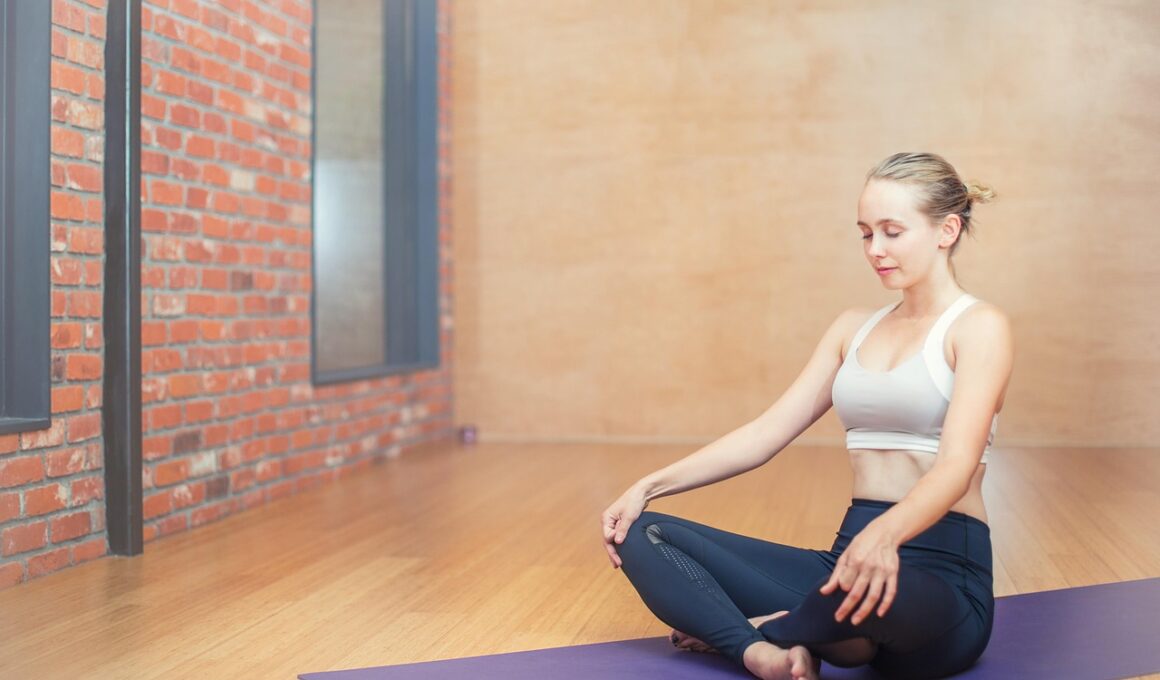Incorporating Mindfulness into Fitness for Healthy Aging
As we age, maintaining physical health becomes increasingly essential, and integrating mindfulness into fitness routines can promote a more balanced and fulfilling approach to aging. Mindfulness involves being present in the moment and embracing awareness, which positively influences our physical and emotional well-being. By incorporating mindfulness within fitness, individuals can cultivate a deeper connection to their bodies, enhancing their overall experience. Some effective ways to practice mindful fitness include slowly engaging in stretches, focusing on breath control during exercise, and tuning into how the body feels in each movement. Mindful fitness creates not only physical benefits but also nurtures mental clarity, emotional stability, and overall happiness. Moreover, it encourages older adults to take charge of their health proactively. Establishing a consistent exercise routine, whether through yoga, tai chi, or walking, fosters a sense of accomplishment and promotes social interaction, crucial for mental health. This article delves into various techniques, practices, and exercises that incorporate mindfulness, ultimately fostering a lifestyle that embraces healthy aging and an enriched way of living as we grow older.
The Importance of Mindfulness and Fitness
Mindfulness can significantly impact our fitness levels, particularly as we age. Practicing mindfulness helps us become more aware of our body’s limitations and capabilities, allowing for safer and more effective workouts. Regular fitness activities lower risks of chronic diseases, including heart disease, diabetes, and even osteoporosis. By infusing mindfulness into these activities, older adults can ensure they exercise with intention, reducing chances of injury. Furthermore, mindful fitness encourages individuals to listen to their bodies, providing insights into when to push harder or pull back. Incorporating elements like meditation and breathwork alongside physical fitness not only contributes to enhanced mental focus but also amplifies overall enjoyment of the process. As mindfulness fosters a positive mindset, it enhances motivation, making it easier to maintain a consistent fitness regimen. Exercises such as walking meditations, where one focuses on the rhythm of steps and breath, offer both physical benefits and a chance to practice mindfulness. This integration of mental clarity alongside physical activity can greatly enrich the healthy aging journey.
Engaging in mindful movements can be particularly beneficial for older adults wanting to improve their physical health and enhance their well-being. Gentle practices like yoga and tai chi directly incorporate mindfulness while promoting balance, flexibility, and strength. These forms of exercise also provide opportunities for reflection and self-awareness, essential components of mindfulness. Tailoring these practices to individual needs is crucial to fostering an environment where one feels safe and empowered. In addition to promoting physical capabilities, mindfulness helps older people develop a positive relationship with exercise, which is valuable for cultivating resilience in the face of age-related challenges. Moreover, mindfulness can counteract the negative thoughts related to aging, allowing individuals to focus on their strengths and capabilities. Mindful fitness also builds community as group classes often encourage interpersonal connections, providing invaluable social support. Classes led by certified instructors can help instill proper techniques, ensuring safety while maximizing the benefits of the movements. By prioritizing mindful fitness, older adults can not only soothe daily stress but also enjoy the process of aging gracefully and confidently.
Mindful Nutrition and Exercise
Merging mindful eating with fitness routines creates a holistic approach to healthy aging. Mindful eating encourages individuals to pay attention to their hunger cues and make conscious food choices that nourish the body. When combined with fitness, this practice can optimize physical health outcomes by ensuring that the body receives the right fuel for exercise. This synergy can also promote a deeper awareness of how specific foods impact energy levels during workouts. Understanding the connection between nutrition and fitness performance is crucial for maintaining motivation and enjoying the fitness journey. Simple practices like savoring each bite and eliminating distractions during meals can lead to healthier habits. Preparing nutritious meals with fresh, whole ingredients enhances well-being and promotes higher energy levels. By committing to mindful eating alongside regular fitness, seniors can achieve weight management, improved digestion, and better mood regulation. Allowing adequate time for both exercise and proper nutrition fosters balance, contributing directly to overall health and longevity. This comprehensive outlook on health empowers older adults to embrace their age actively while striving to improve their quality of life.
Mindful practices can also aid in developing a consistent routine that enhances mental well-being. Chronic stress and anxiety can significantly impact aging, but incorporating mindfulness techniques into fitness routines can reduce these feelings, leading to better mental health. Emphasizing self-compassion and patience is crucial during this process, especially as physical capabilities may change over time. Mindfulness encourages a growth mindset where obstacles become opportunities to learn and grow rather than sources of frustration. Additionally, integrating gratitude practices within fitness routines can elevate mood and overall satisfaction in life. Appreciating the ability to move, exercise, and embrace nature inspires motivation. This positive mindset can be fostered in activities like journaling about workouts or expressing gratitude for physical capabilities. Participating in group fitness classes also serves to bolster social connections, an often-overlooked aspect of healthy aging. Exercising alongside others can create a supportive network that further nurtures mental health. Ultimately, a focused approach to fitness and mindfulness together balances emotional stability, enriching the overall healthy aging experience.
Practical Tips for Mindful Fitness
Incorporating mindfulness into fitness routines may seem challenging, but practical strategies can enhance the practice. Start by establishing specific parameters for your workouts, such as setting aside dedicated time, free from distractions. Consider practicing yoga to develop body awareness, focusing solely on your breath, and the sensations in your muscles. Alternatively, engage in nature walks, fixing attention on the environment around you, promoting peace and grounding. Regular breaks during workouts allow reflection and goal evaluation, fostering personal growth in the fitness journey. Additionally, mindfulness apps can provide structured sessions that guide users through workouts while emphasizing present moments. Allocate time for meditation or breathing exercises before and after physical sessions to center your thoughts and deepen your connection to exercise. All these steps can help cultivate a consistent mindful fitness practice and promote better results. Remember, adapting workouts according to your capabilities is vital; mindfulness should never lead to pain or stress. Above all, bear in mind that every little effort matters, contributing to healthier aging and overall well-being.
In conclusion, embracing mindfulness within fitness routines creates a holistic approach to healthy aging. Mindfulness allows individuals to present, cultivating awareness of both body and mind, resulting in a profound impact on aging. Effective fitness strategies such as mindful eating, reflection practices, and connecting with others contribute to a rich experience. These techniques underscore the importance of nurturing not only physical health but also emotional well-being. Aging can bring challenges, but incorporating mindfulness into fitness empowers individuals to confront these hurdles with resilience and grace. Moreover, prioritizing community connections through group activities fosters social interactions, crucial for mental health and motivation. As people continue their fitness journeys, embracing mindful practices can yield lasting benefits. Encouragement from peers and supportive instructors helps individuals achieve their goals while fostering personal growth. By committing to this mindful approach, older adults enhance their quality of life while facilitating a smooth transition into the later stages of life. Ultimately, incorporating mindfulness into fitness is a lifestyle choice that sustains active living, focusing on health, happiness, and longevity in our golden years.
This mindful lifestyle promotes balance, leading to a more enriching experience as we age.


